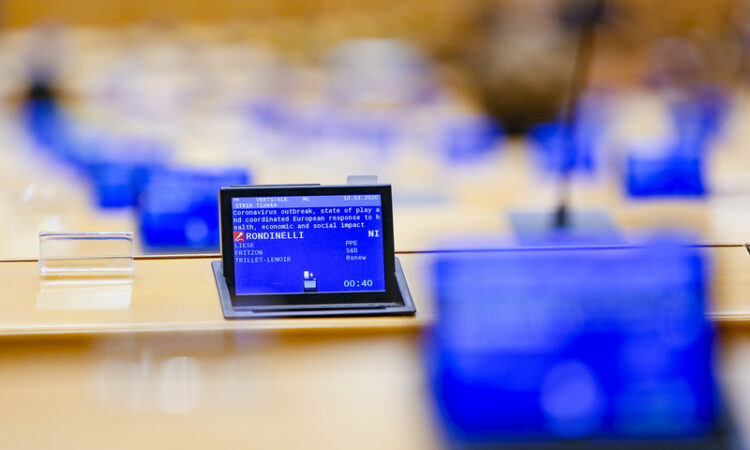
Belgian, Czech, and Polish spies are chasing down MEPs who took Russian money ahead of EU elections, as those linked to one pro-Russia website hire lawyers and cry “slander”.
The Czech and Polish domestic spy agencies BIS and ABW, which do counterintelligence, went public last week with allegations that European politicians had received illicit money via Voice of Europe, a Prague-based media organisation, known for publishing pro-Russian propaganda.
But the disclosures were just part of a wider, concerted probe into Russian interference in the European Parliament (EP) by European intelligence services, involving also Belgium’s VSSE domestic spy agency.
“We cooperate with the intelligence services of several countries, including Belgium,” BIS told EUobserver.
There was no sign so far that Belgian MEPs had been paid by the “pro-Russian network”, a Belgian source also said.
But there were “strong indications that this is the case for MEPs of other nationalities”, the source added.
And the full investigation might take “months” to run its course, a second Belgian contact said.
The VSSE declined to comment.
The BIS and ABW have not named names so far, but BIS had a 300-page dossier on illicit payments worth “millions of [Czech] crowns” (tens of thousands of euros), it has said.
ABW seized €72,000 in cash in raids in the Warsaw region.
Possible repercussions
MEPs can be prosecuted on corruption or espionage charges by national authorities, while Belgium’s VSSE is involved because its jurisdiction covers the home territory of the EP and other EU institutions.
The EP can also impose fines on MEPs who failed to declare payments from Russia or other third parties.
The EU counterintelligence dragnet comes ahead of EP elections in June.
And MEPs are preparing to spotlight the threat of Russian interference by discussing the Czech and Polish revelations in a plenary debate in Strasbourg on 10 April.
“Disciplinary action must be swiftly taken against any MEPs or [EP election] candidates involved,” said the office of Liberal French MEP Valérie Hayer, who first called for the EP discussion.
“A full and transparent internal investigation by the president of the European Parliament is now needed,” her office added.
The Voice of Europe has been around since 2017, but was relaunched in Prague in 2023, and was “controlled and funded directly by the Russian Federation”, in a network run by a pro-Kremlin Ukrainian oligarch called Viktor Medvedchuk, according to a statement by the Czech intelligence service.
Some 12 MEPs had appeared on its YouTube channel, according to research by Anton Shekhovtsov, director of the Centre for Democratic Integrity, a think-tank in Vienna.
None of the 12 stand accused of breaking the law or the EP’s code of conduct.
But those of them who replied to EUobserver showed just how toxic Voice of Europe and Russia more broadly speaking have become after Shekhovtsov’s list went viral.
Five of the 12 came from the EP’s normally pro-Russian Independence and Democracy (ID) group.
These were French MEPs Patricia Chagnon and Thierry Mariani, German MEPs Maximilian Krah and Joachim Kuhs, and Belgian MEP Tom Vandendriessche.
Two came from the right-wing European Conservatives and Reformists (ECR) group — Spanish MEP Hermann Tertsch and Croatian MEP Ladislav Ilčić.
The rest were non-attached MEPs from France, Italy, the Netherlands, and Slovakia.
MEPs cry slander
Chagnon, Ilčić, Krah, Kuhs, and Vandendriessche all said they gave interviews to Voice of Europe in good faith, but they complained of “slander” and “defamatory” speculation about them in European media and social media in the past few days.
“My lawyer is investigating this,” said Chagnon.
“Not only did I never receive any money from Russia, or from this media [Voice of Europe]. I didn’t even get a gift pen or lighter or any promotional material. They didn’t offer me so much as a drink,” she said.
The ECR’s Ilčić said he was “pro-Ukraine” and “was pretty surprised when I found out that my name is being linked with Russian propaganda and political influence, which is complete nonsense”.
Krah’s office said he’d once met Medvedchuk on official business, back when Medvedchuk was part of a Ukrainian inter-parliamentary delegation, but said “no money has [ever] been offered [by Russia] to promote any position”.
Vandendriessche said: “Any accusations of me being payed or being ‘promoted’ are ridiculous”.
Chagnon, Ilčić, Krah, and Kuhs said they welcomed the EP plenary debate on Russia next week to clear the air, but Ilčić said “it won’t be a debate, but a political trial”.
The ID’s Vandendriessche said the whole affair was “part of a coordinated attempt to … discredit the nationalist and conservative opposition”.
What some media have dubbed ‘Russiagate’ comes after the Qatargate scandal in 2022, which saw MEPs accused of taking bribes from Morocco and Qatar.
But Russia is seen as posing a security threat on top of any corruption problem, with Belgium’s VSSE having expelled over 40 suspected Russian spies since Russia’s full-scale invasion of Ukraine two years ago.
And the EP was still investigating allegations that a Latvian MEP, Tatjana Ždanoka, who denies wrongdoing, had colluded with Russian intelligence services, an EP source said.






